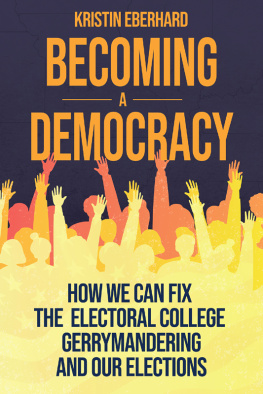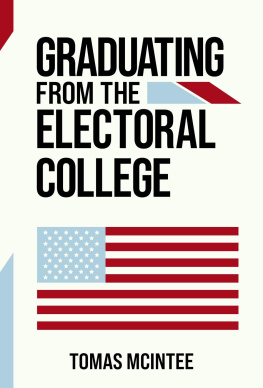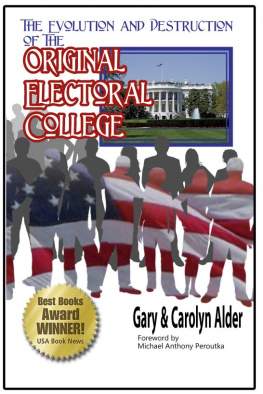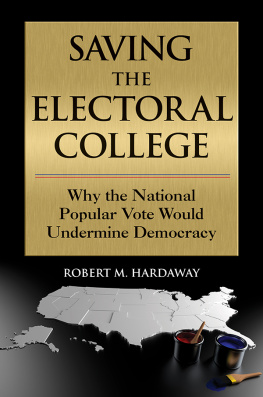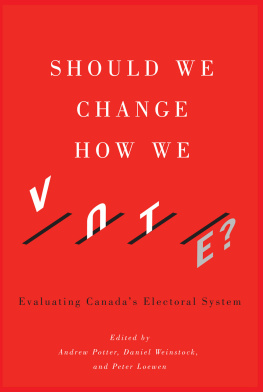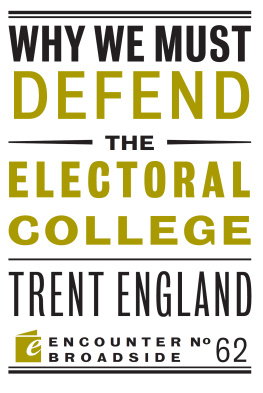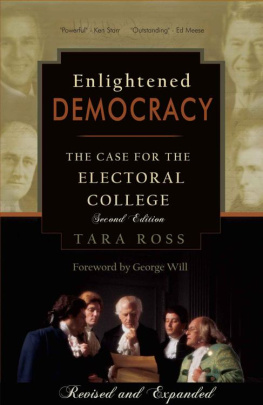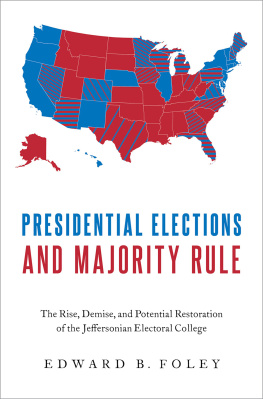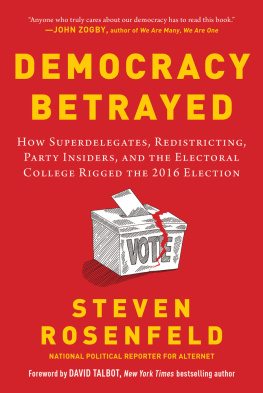Contents
- 8. THREE DISPUTED ELECTIONS: 1800, 1824, AND 1876
Norman J. Ornstein - 9. THE 2000 ELECTION
John C. Fortier
- 10. LETS HEAR IT FOR THE ELECTORAL COLLEGE
Walter Berns - 11. WHY OLD AND NEW ARGUMENTS FOR THE ELECTORAL COLLEGE ARE NOT COMPELLING
Akhil Reed Amar and Vikram David Amar - 12. EXCERPTS FROM THE ELECTORAL COLLEGE AND THE AMERICAN IDEA OF DEMOCRACY
Martin Diamond - 13. PUBLIC OPINION ON THE ELECTORAL COLLEGE
Karlyn Bowman
Guide
John C. Fortier is the director of governmental studies at the Bipartisan Policy Center, where he directed the Commission on Political Reform. He was previously a research fellow at the American Enterprise Institute (AEI), where he also served as executive director of the Continuity of Government Commission, principal contributor to the AEI-Brookings Election Reform Project, and participant in AEIs Election Watch. He was the director of the Center for the Study of American Democracy at Kenyon College and taught at the University of Pennsylvania, University of Delaware, Harvard University, and Boston College. Fortier served as an adviser to the Presidents Commission on Election Administration and a member of the American Law Institutes Project on Election Administration. He is the editor of the third edition of After the People Vote: A Guide to the Electoral College (AEI Press, 2004) and author of Absentee and Early Voting: Trends, Promises, and Perils (AEI Press, 2006), as well as other books and scholarly and popular articles. He is a frequent radio and television commentator on Congress, the presidency, and elections.
Walter Berns was a resident scholar at the American Enterprise Institute. He taught at Georgetown University, University of Toronto, Cornell University, and Yale University. His government service included membership on the National Council on the Humanities, the Council of Scholars in the Library of Congress, and the Judicial Fellows Commission. In 1983, he was a US delegate to the United Nations Commission on Human Rights. He was a Guggenheim, Rockefeller, and Fulbright fellow and a Phi Beta Kappa lecturer. He authored numerous articles on American government in both professional and popular journals; his books include Making Patriots (University of Chicago Press, 2001), Taking the Constitution Seriously (Simon & Schuster, 1987), and In Defense of Liberal Democracy (AEI Press, 1984). He was the editor of the first and second editions of After the People Vote: A Guide to the Electoral College. Berns passed away in 2015.
Akhil Reed Amar is Sterling Professor of Law and Political Science at Yale University, where he teaches constitutional law in both Yale College and Yale Law School. He is a member of the American Academy of Arts and Sciences and a recipient of the American Bar Foundations Outstanding Scholar Award. He is the author of dozens of law review articles and several books, including The Constitution Today: Timeless Lessons for the Issues of Our Era (Basic Books, 2016), named one of the years top 10 nonfiction books by Time magazine; The Law of the Land: A Grand Tour of Our Constitutional Republic (Basic Books, 2015); Americas Unwritten Constitution: The Precedents and Principles We Live by (Basic Books, 2012), named one of the years 100 best nonfiction books by the Washington Post; Americas Constitution: A Biography (Random House, 2005), winner of the American Bar Associations Silver Gavel Award; The Bill of Rights: Creation and Reconstruction (Yale University Press, 1998), winner of the Yale University Press Governors Award; and The Constitution and Criminal Procedure: First Principles (Yale University Press, 1997).
Vikram David Amar joined the University of Illinois College of Law as its dean in 2015, after having been a professor of law for many years at law schools in the University of California system, most recently the University of California, Davis, School of Law, where he served as senior associate dean for academic affairs. He has produced several books and over 60 articles in leading law reviews. He is a coauthor (with Akhil Reed Amar and Steven Calabresi) of the upcoming sixth edition of the six-volume Treatise on Constitutional Law (West Publishing Co., 2021), pioneered by Ron Rotunda and John Nowak, as well as the hardbound and soft-cover one-volume hornbooks that derive from it. He is also a coauthor (with Jonathan Varat) of Constitutional Law: Cases and Materials (Foundation Press, 2017), a coauthor on multiple volumes of the Wright & Miller Federal Practice and Procedure Treatise (West Publishing Co., 2006), and a coauthor (with John Oakley) of American Civil Procedure (Kluwer Law International, 2008).
Karlyn Bowman is a resident fellow at the American Enterprise Institute. She compiles and analyzes American public opinion using available polling data on a variety of subjects, including the economy, taxes, the state of workers in America, the environment and global warming, attitudes about homosexuality and gay marriage, NAFTA and free trade, the war in Iraq, and womens attitudes. In addition, Bowman has studied and spoken about the evolution of American politics because of key demographic and geographic changes. She was managing editor of Public Opinion and editor of the American Enterprise. She has often lectured on the role of think tanks in the United States and writes a weekly column for Forbes.com.
Martin Diamond died in 1977 just before he was to assume the Leavey Chair on the Foundations of American Freedom at Georgetown University. He taught at the University of Chicago, Illinois Institute of Technology, Claremont Mens College, Claremont Graduate School, and Northern Illinois University. Diamond also served as a fellow for the Center for Advanced Study in the Behavioral Sciences, the Rockefeller Foundation, the Realm Foundation, the Woodrow Wilson International Center for Scholars, and the National Humanities Institute. A frequent adviser to private and public agencies and to local, state, and federal officials, including senators, congressmen, and presidents and vice presidents of the United States, he spent the last morning of his life testifying before a Senate committee on the Electoral College. His essays appear in As Far as Republican Principles Will Admit: Essays by Martin Diamond (AEI Press, 1992).
Norman J. Ornstein is a resident scholar at the American Enterprise Institute (AEI), where he studies politics, elections, and the US Congress. He is a cohost of AEIs Election Watch series, a contributing editor and columnist for National Journal and the Atlantic, a BBC News election analyst, and the chairman of the Campaign Legal Center. Ornstein previously served as codirector of the AEI-Brookings Election Reform Project and senior counselor to the Continuity of Government Commission. His articles and opinion pieces have been published widely, including in Politico, the New York Times, New York Daily News, the Wall Street Journal, and the Washington Post. His books include the bestsellers One Nation After Trump: A Guide for the Perplexed, the Disillusioned, the Desperate, and the Not-YetDeported, with E. J. Dionne and Thomas E. Mann (St. Martins Press, 2017); Its Even Worse Than It Looks: How the American Constitutional System Collided with the New Politics of Extremism (Basic Books, 2012); The Broken Branch: How Congress Is Failing America and How to Get It Back on Track, with Thomas E. Mann (Oxford University Press, 2006); and The Permanent Campaign and Its Future


